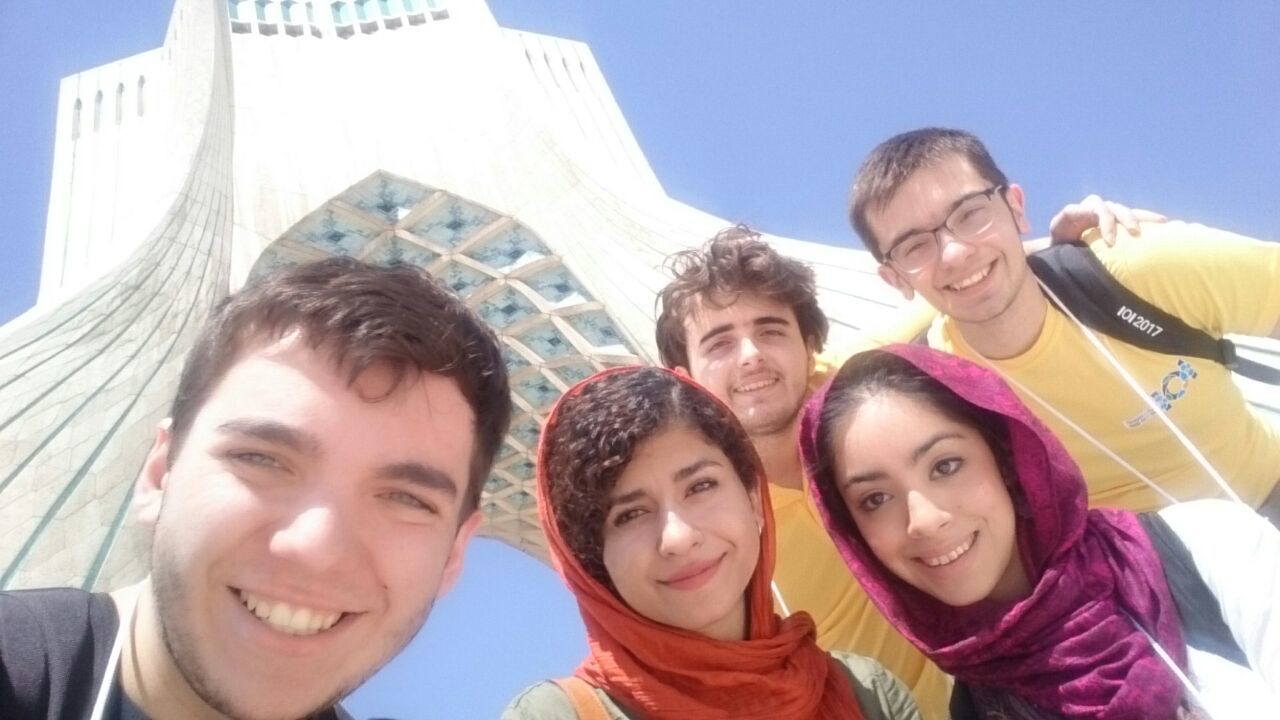During high school, I was lucky enough to have the best of teachers, and he introduced me to competitive programming. His name is Claudio Paz, and he's everything a teacher should be. Instead of teaching us Ms Word, as he was meant to, he asked us if we wanted to do something different. I was 15 at the time and didn't really care because I thought I'd probably hate it anyways, since it was school. I was so wrong. He taught us how to code, but not in the standard way. We were given new problems every week, and then we'd discuss approaches together. Coming up with a solution was the hard part, and we learned syntax along the way. The coolest part was learning a new type of logical reasoning that I wasn't used to.
 Me with my coach, Claudio, and my boyfriend, Santiago, at the 2017 Interolympic Symposium.
Me with my coach, Claudio, and my boyfriend, Santiago, at the 2017 Interolympic Symposium.
My classmate and I participated in the National Olympiad that year. To be honest with you, we didn't do well. However, it didn't matter, this experience changed me. I knew this is what I wanted to do, but it was intimidating to see how good the other contestants were. It felt like no matter how many hours I put into it or how hard I tried, I'd never be on their level. This drove me crazy, but it became my passion.
The fact that a physics degree is so general is a double-edged sword. It opens many doors, but it's up to you to go the extra mile to specialize.
On my last year of school, I took part in a two week long training camp along with my boyfriend. It was because of the experiences we had and the people we met there, that we fell truly in love with the world of competitive programming. For me, it was more about the experiences and the community than about the scores. I stopped seeing others as competition and more as possible friends, people like me with whom I share a common interest. That's why I always say that I gained a whole lot more than just coding skills.
After coming back from the training camp, I started to spend all my free time practicing. At school, the teachers probably hated me because I was always on my laptop doing problems, half listening to class. That year I ended up getting the first place in my division at the national olympiads and was selected to participate in the IOI the next year.
 Argentina team with our guide at the 2017 IOI, Iran.
Argentina team with our guide at the 2017 IOI, Iran.
Fast forward a couple of years, my passion for competitive programming never went away, but I didn't see a viable career path. I moved to study in Russia, where it's virtually impossible (at least for me) to participate in ACM-ICPC. Russians are one of the bests in the world, after all. Besides, I already had enough in my plate: doing a full degree in a foreign language...
The "aha" moment after cracking a problem, or the dark process of reading through it and not even knowing where to start. It was a déjà vu.
Now, I had to decide if I still wanted to study Computer Science. I spent many hours researching career options but didn't find anything like what I wanted to do. Building useful stuff sounds cool, but what I truly enjoyed was problem solving. So, maybe I could go into research?
This is when I discovered the Irodov books and realized solving physics problems was so similar to competitive programming. The "aha" moment after cracking a problem, or the dark process of reading through it and not even knowing where to start. It was a déjà vu.
After a month of working through Irodov's problems, I was considering a career in physics. The main turn off was that I wasn't sure if would enjoy doing research. The fact that a physics degree is so general is a double-edged sword. It opens many doors, but it's up to you to go the extra mile to specialize. This sounded promising, so I decided to take on the challenge.
As I'm writing this, I have no regrets. I think I just found the perfect field that combines programming and physics: computational physics. More specifically, computational fluid dynamics.
I hope my story can serve as an inspiration to others who are choosing career paths, I wish you the best of lucks! Remember to keep exploring new areas, even if it seems completely different from what you are currently doing.






